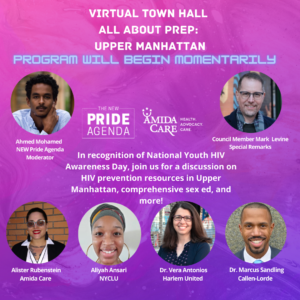Amida Care and NEW Pride Agenda Host “All About PrEP” Town Hall, With a Focus on HIV Prevention in Upper Manhattan and Among Youth
April 30 2021
Online discussion featured New York City Council Member Mark Levine, Aliyah Ansari of the New York Civil Liberties Union, Dr. Vera Antonios of Harlem United, Ahmed Mohamed of NEW Pride Agenda, Alister Rubenstein of Amida Care, and Dr. Marcus Sandling of Callen-Lorde Community Health Center
To view a recording of the Town Hall, click here
 On Tuesday, April 27, Amida Care, New York’s largest nonprofit Medicaid Special Needs Health Plan (SNP) designed for New Yorkers affected by HIV, co-hosted a town hall event with the NEW Pride Agenda, a nonprofit LGBTQ advocacy organization that works to promote LGBTQ rights in New York State, to discuss pre-exposure prophylaxis (PrEP), which is proven to reduce the risk of getting HIV from sex by 99%.
On Tuesday, April 27, Amida Care, New York’s largest nonprofit Medicaid Special Needs Health Plan (SNP) designed for New Yorkers affected by HIV, co-hosted a town hall event with the NEW Pride Agenda, a nonprofit LGBTQ advocacy organization that works to promote LGBTQ rights in New York State, to discuss pre-exposure prophylaxis (PrEP), which is proven to reduce the risk of getting HIV from sex by 99%.
The panel discussion, with experts from HIV and LGBTQ service organizations, focused on HIV prevention in Upper Manhattan. In recognition of National Youth HIV/AIDS Awareness Day, panelists also addressed the unique challenges faced by young people in HIV prevention, emphasizing the importance of comprehensive sex education in combating HIV and other sexually transmitted infections (STIs).
“For the last year, we have been so focused on [the COVID-19] pandemic that I fear that the city has not been paying enough attention to existing public health crises like the HIV epidemic,” said Mark Levine, New York City Council Member representing Manhattan’s 7th Council District in Upper Manhattan and Chair of the Council’s Health Committee. “These are the kinds of public health crises which impact people who are often neglected by the mainstream medical system and people who are also confronting the challenges of racism, homophobia, and transphobia.”
“Today’s event has a special focus on youth HIV prevention. Young people must have access to the information and tools they need to reduce their risk of HIV,” added Ahmed Mohamed, Civic Engagement and Community Organizer at NEW Pride Agenda and moderator for the discussion. “Schools have a crucial role to play in teaching young people about sexual health, gender identity, and HIV prevention—and in facilitating access to HIV and other sexual health and well-being counseling.”
Several panelists addressed the importance of beginning this education as soon as possible. “Comprehensive sexual health education should be in grades K through 12. It is medically accurate and age appropriate, as well as inclusive…it also encompasses a wide range of topics, including puberty, reproduction, sexual orientation, and gender identity,” said Aliyah Ansari, Teen Health Strategist for the New York Civil Liberties Union. “Comprehensive sexual health education is health education, and it is important education.”
Education remained a common theme as panelists pivoted to talk about the role of health care providers. “We need to make sure we educate and encourage health care providers to look into their unconscious biases, and make sure they are comfortable talking about sexual behavior and practices on a regular basis,” said Dr. Vera Antonios, Medical Director of Health Services at Harlem United.
Addressing unconscious biases is particularly important with regard to gender-affirming care. “It’s so hard to get transgender people through the door of a doctor’s office—and then what happens once they get there?” said Alister Rubenstein, Transgender Health Program Manager at Amida Care. “You can have a trans affirming provider, but you need to get through a lot of people to get to that doctor. It can be very traumatizing if the care isn’t gender-affirming and trauma-informed.”
“Now that we have PrEP, this great medication that can reduce the risk of people acquiring HIV, how do you actually get it from the drug company into the hands of people that need it most?” added Dr. Marcus Sandling, Clinical Director of Sexual Health for Community Health at Callen-Lorde Community Health Center. “Some of the big issues that we see come from [lack of] access to medical care and financial resources to actually pay for the medication, as well as an infrastructure that helps to deal with everything outside of just physically getting the medication…there are still a lot of logistical challenges.”
The town hall concluded with an interactive quiz for audience members, aimed at dispelling common myths and misconceptions about PrEP. Local resources were available for those interested in learning more about accessing PrEP in Upper Manhattan.
